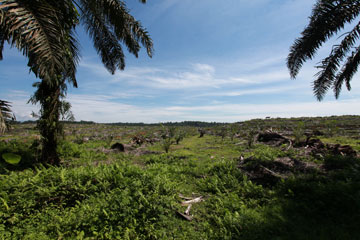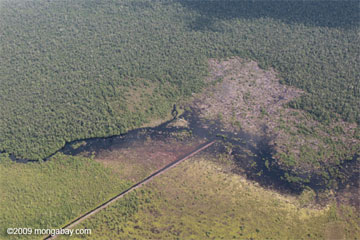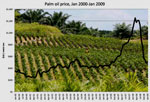The Malaysian government’s federal land agency (FELDA) is now denying its well-documented plan to develop oil palm plantations in the Amazon rainforest, reports Ecological Internet, a forest advocacy group that carried out a campaign against the project.
“In a positive yet puzzling development, a spokesperson for the Malaysian government’s federal land agency (FELDA) now denies plan for Malaysian government controlled oil palm development in the heart of the Amazon ever existed,” Glen Barry, founder of Ecological Internet and organizer of the campaign, wrote via email. “Wan Zaleha Wan Embong, from FELDA’s Public Relations Department, has been responding to our network’s protest emails, disavowing the plans.”
Barry speculated that the apparent change of plans could be “an attempt to save face” in response to more than 100,000 protest emails, economic difficulties caused by a dramatic fall in the price of palm oil, or simply an attempt to mask the government’s involvement by reorganizing the project with private, rather than government, capital.

Oil palm plantation in North Sumatra in May 2009 |
Last July Deputy Prime Minister Datuk Seri Najib Razak (now Malaysia’s Prime Minister) announced that FELDA would immediately establish 100,000 hectares (250,000) of oil palm plantations in the Brazilian Amazon.
“As a start, 20,000ha in Tefe will be opened for oil palm planting. After that, between 3,000ha and 5,000ha will be opened yearly,” he said. “Felda wants to emulate Petronas as a global player,” he added, referring to Malaysia’s national oil company.
At the time FELDA said it would partner with Braspalma, a local company, to form Felda Global Ventures Brazil Sdn Bhd. FELDA would have a 70 percent stake in the venture.
The deal appeared to still be in the works up until at least late March 2009, according to a post on the from Palm Oil Truth Foundation, a web site run by a palm oil marketing firm. But now, per the comments from FELDA’s spokesman, the deal has been shelved.

Clearing and draining of peatland for oil palm in Central Kalimantan in May 2009 |
“Something has changed over the last 8 weeks,” said Barry. “It appears our protest by 3,082 people from 78 countries, in which 101,611 protest emails were sent, seems to have deeply embarrassed the Malaysian government. Immediately after our alert launched, references to plans by Malaysia‘s federal land agency to establish up to 100,000 hectares of oil palm plantations in the heart of Brazil’s Amazon rainforest were systematically removed from FELDA’s Internet servers. And Streamyx, the monopoly Internet service provider in Malaysia, stopped delivering emails referring to Malaysia’s global rainforest for oil palm land grab.”
Barry says he won’t be surprised to see the project re-emerge under a different name without direct government involvement of the Malaysian government.
Ecological Internet and other environmental groups have been campaigning against the conversion of natural forests for oil palm plantations, which in recent years has become a significant driver of deforestation, especially in Malaysia and Indonesia.
Ecological Internet Oil Palm Campaign
RELATED
Is oil palm the next emerging threat to the Amazon
(03/23/2009)
The Amazon Basin appears poised to experience rapid expansion of oil palm agriculture. Nearly half of Amazonia is suitable for oil palm cultivation, and Malaysian corporations are now moving into the region to establish new plantations while the Brazilian government is considering a law that would count oil palm as “forest” towards a landowner’s forest reserve requirement. Strong economic incentives for a major Amazonian oil palm industry are likely, given growing global demands for edible oils, oil-based products, and biofuel feedstocks. We have two main concerns. First, oil palm plantations are ecologically depauperate, supporting little forest-dependent wildlife. Second, we disbelieve political and corporate statements suggesting that oil palm plantations will be concentrated on previously deforested lands in Amazonia. In reality, oil palm producers strongly favor clearing primary forest for plantations because they can reap immediate profits from timber production. These profits subsidize the costs of plantation establishment and maintenance for the initial 3-5 years until the oil palm plantations become profitable. Hence, oil palm agriculture could soon emerge as a major new threat to the Amazonian environment.

Will palm oil drive deforestation in the Amazon?
(03/23/2009)
Already a significant driver of tropical forest conversion across southeast Asia, oil palm expansion could emerge as threat to the Amazon rainforest due to a proposed change in Brazil’s forest law, new infrastructure, and the influence of foreign companies in the region, according to researchers writing in the open-access journal Tropical Conservation Science. William F. Laurance, a senior scientist at the Smithsonian Tropical Research Institute (STRI) in Panama City, Panama, and Rhett A. Butler, founder of environmental science web site Mongabay.com, warn that oil palm expansion in the Brazilian Amazon is likely to occur at the expense of natural forest as a result of a proposed revision to the forest code which requires land owners to retain 80 percent forest on lands in the Amazon. The new law would allow up to 30 percent of this reserve to consist of oil palm.














